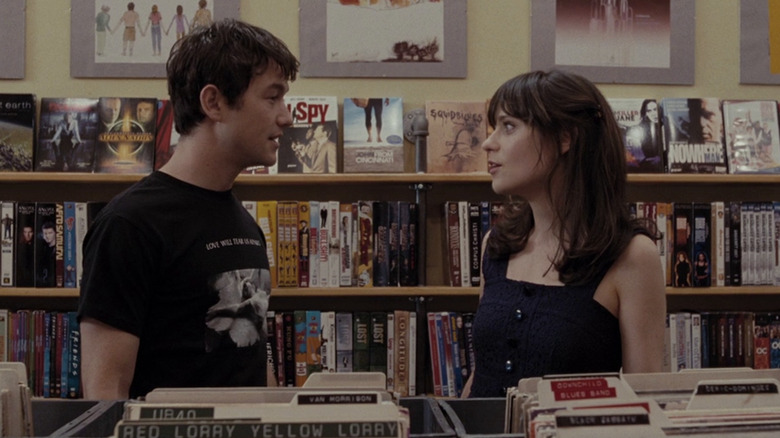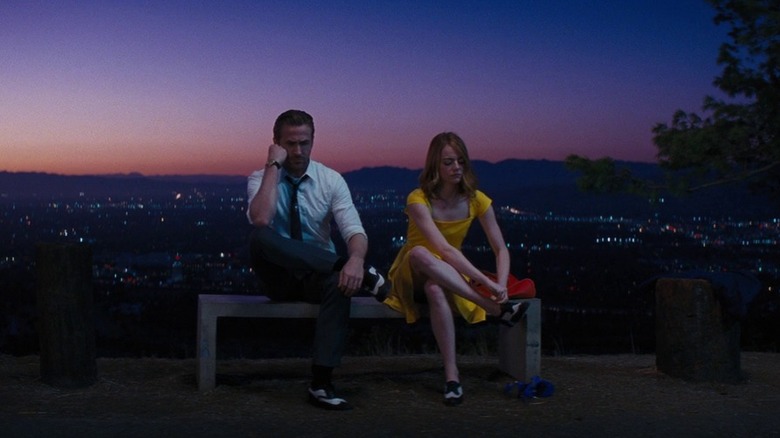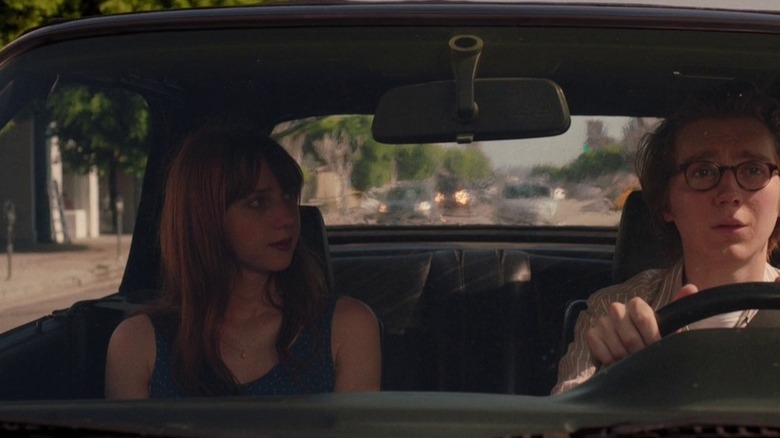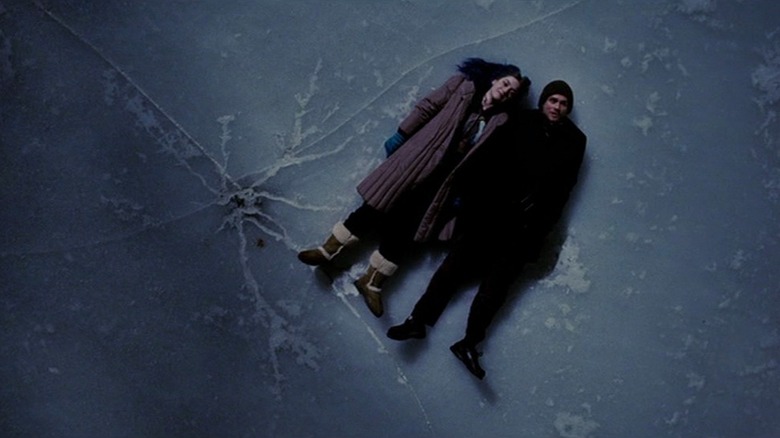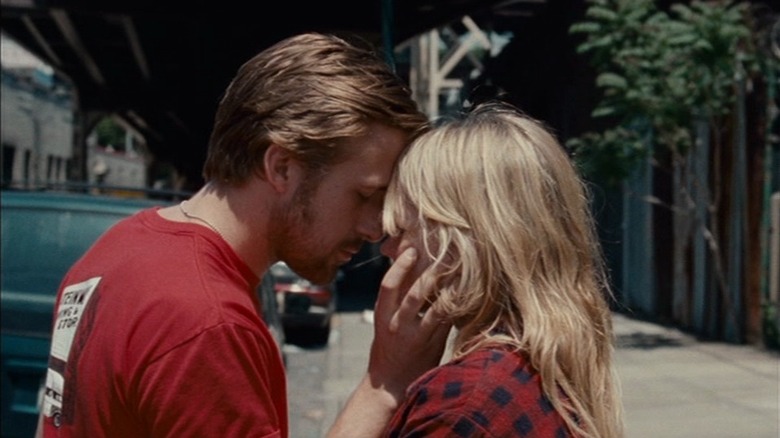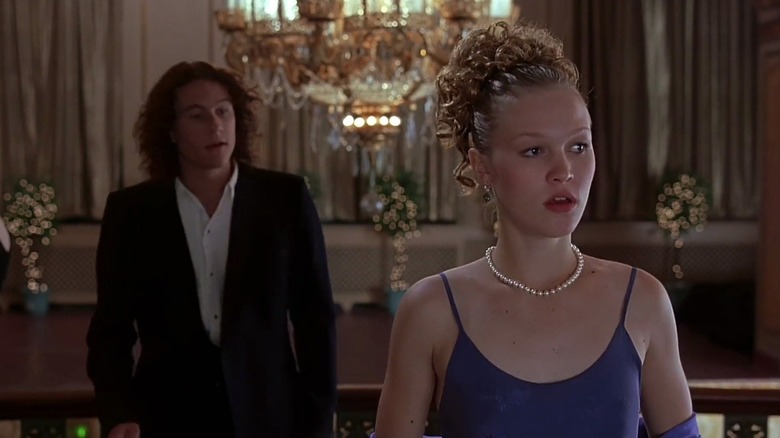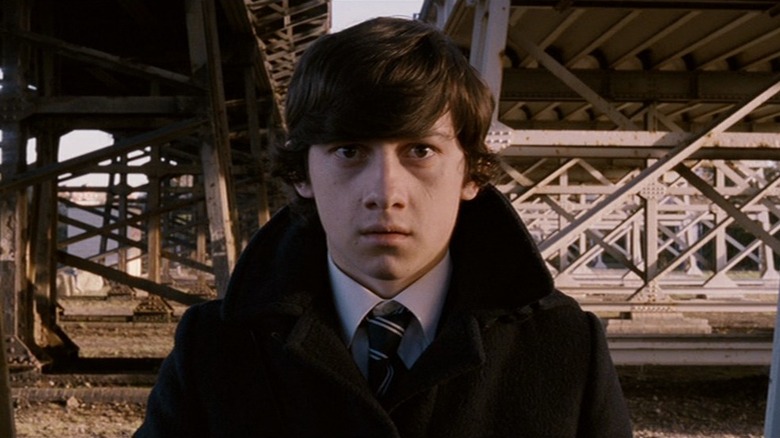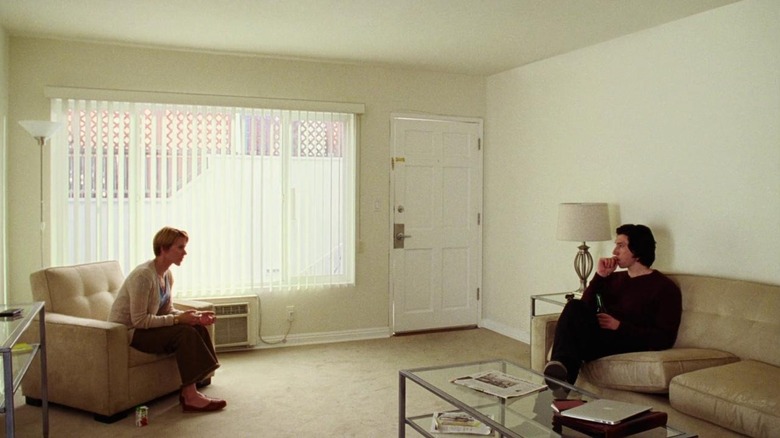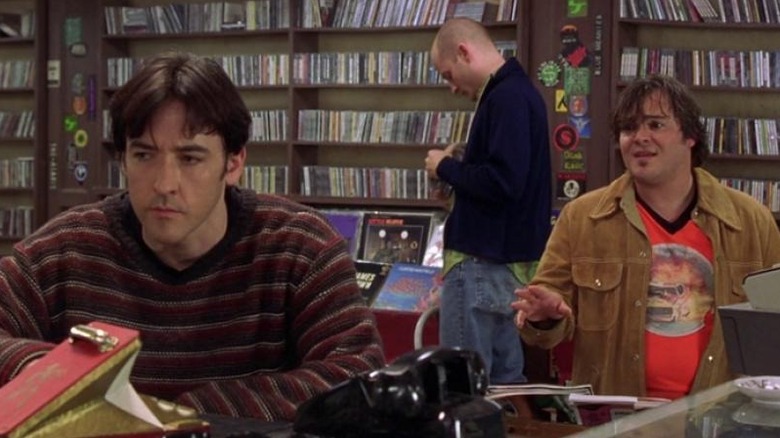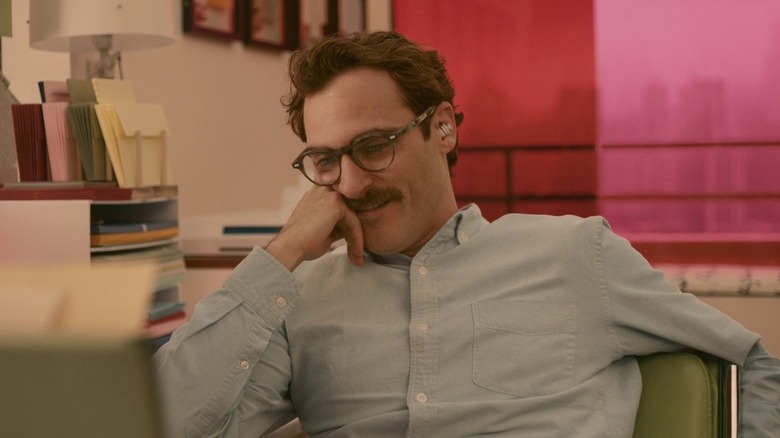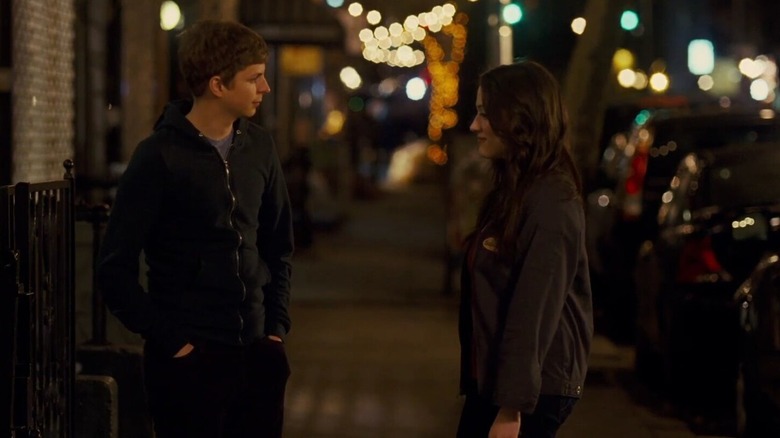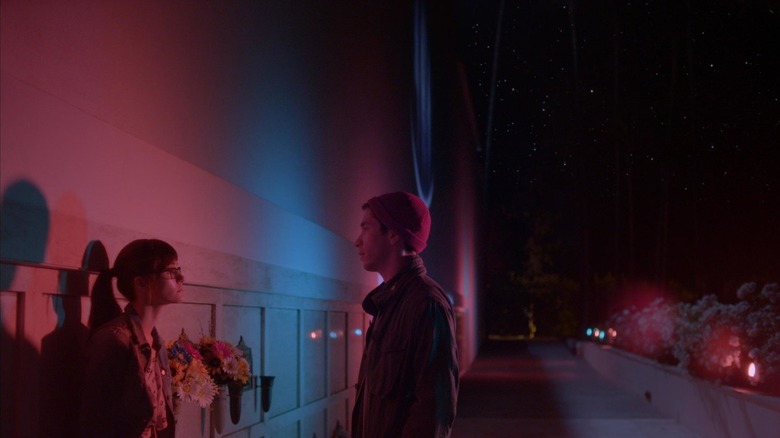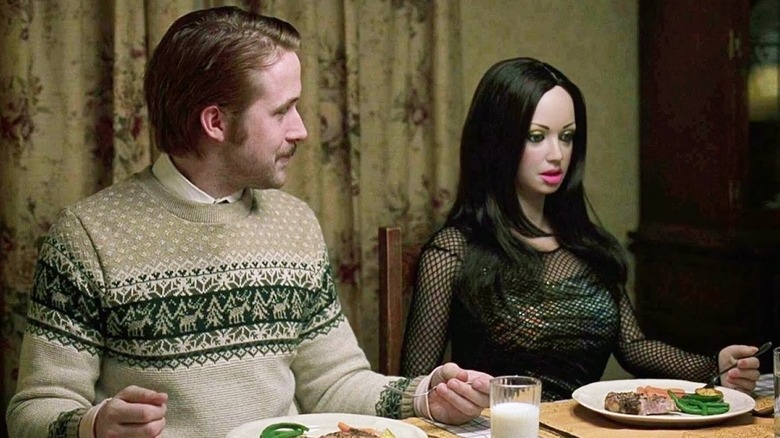12 Movies Like 500 Days Of Summer You'll Love
We're all familiar with the rom-com formula by now: two people meet, they fall in love, and they invariably live happily ever after. That's what countless stories have shown us, but 2009's "(500) Days of Summer" turns this idea on its head to present an alternative notion. Through the up-and-down relationship between Tom (Joseph Gordon-Levitt) and Summer (Zooey Deschanel), we explore the following: What if the dream girl isn't actually the dream girl after all?
Despite the voiceover at the start of the movie warning us that this isn't a love story, it's hard not to shake those ingrained ideas we have about romance. Tom and Summer's relationship looks perfect on the surface, so why does it not work out the way we think it should? "500 Days of Summer" interrogates everything we think we know about movie romances. Our preconceived notions of love — something that this film acknowledges comes from consuming too many or occasionally misreading movies — have skewed our views when it comes to finding the ideal partner.
If you're looking for more alternative romantic movies like "500 Days of Summer," here are some that you'll love. There are those that don't end the way you think they should, some that play around with a similar non-linear structure, and other bittersweet romances that prove love isn't always the way we see it in the movies.
La La Land
Movies often influence our ideas about love and "500 Days of Summer" acknowledges it directly. And if you had to pinpoint one genre where you can almost always guarantee that things will end happily, it is the movie musical. In "La La Land," director Damien Chazelle takes this idea, runs with it, and rips your heart out in the process.
In the movie we meet Mia (Emma Stone) and Sebastian (Ryan Gosling). She's an aspiring actress and he's a frustrated jazz musician with dreams of opening his own club. Under the sunny skies of Los Angeles, their paths cross and initial resentment soon blossoms into a picture-perfect romance. Or so we think. As Mia and Sebastian pursue their individual dreams, they are driven further apart from their dream of also being with each other.
The genius of "La La Land" is in the way Chazelle subverts audience expectations. The nods it makes to movies such as "Singin' in the Rain," "Sweet Charity," and "Top Hat" lead us to believe that Mia and Sebastian's story will end with them walking off into the sunset together. The heartbreaking reality is very different, but like "500 Days of Summer," you can argue that the end of "La La Land" is not an unhappy one, just bittersweet. Mia and Sebastian get what they've always wanted; it just isn't with each other.
Ruby Sparks
For Tom in "500 Days of Summer," Summer is his ideal girl, the one he couldn't have written better for himself even if he'd tried — or at least so he believes. "Ruby Sparks" takes a similar idea of an on-paper "dream girl" for its wonderfully unique concept. Calvin (Paul Dano) is a successful writer, struggling with his latest novel and trying to form relationships with anyone other than his dog and therapist. Calvin is prompted to write about his perfect woman, who he names Ruby Sparks (Zoe Kazan), and is shocked to discover he has brought his literary creation to life.
Once Calvin's disbelief settles down, he can't quite believe his luck — his dream girl has appeared from the pages of his typewriter, and she's real. However, Ruby is a free spirit, and when she starts to have ideas of her own, Calvin's behavior becomes controlling, and things soon spiral out of control. The moral of "Ruby Sparks" is that there is no on-paper ideal partner — something that Tom learns about Summer as well. People are layered and complicated, and they certainly won't always act in the way you hope they will — or, in this case, the way Calvin has written. Loving someone's quirks and foibles and accepting that no one is perfect — however flawless they may first appear — is a much more sustainable option than trying to mold them into being the ideal person.
Eternal Sunshine of the Spotless Mind
The non-linear structure of "500 Days of Summer" is one of the many brilliant things about it. Eschewing the standard structure of romantic movies adds an interesting layer — we see where it ends up before jumping backward and forward to create the full picture of the relationship. A non-linear structure is also one of the more effective ways of mimicking how our minds work and how we recall memories, and this is certainly the case with "Eternal Sunshine of the Spotless Mind."
Following a breakup, Clementine (Kate Winslet) decides to erase her memories of Joel (Jim Carrey) and he elects to do the same. As he relives some of their happier moments together, he realizes he doesn't want to forget her, and perhaps there could still be a world where they repair their relationship and give it another go.
Memory is a fascinating subject, and the way "Eternal Sunshine of the Spotless Mind" blends science fiction ideas with a romantic plot is absolutely captivating. Joel re-experiencing the happier memories he had with Clementine also has a double edge to it. On the one hand, it reminds him of why they fell in love in the first place and prompts him to seek her out again. On the other hand, it is perhaps offering a skewed version of the truth and a longing for "what once was" while ignoring their more fractious moments. It is an intriguing debate that will linger with you even after the credits roll.
Blue Valentine
"Blue Valentine" is a tough watch, but also a very real one, showing us the breaking point first before we go back in time to see how it began. "500 Days of Summer" does something very similar, but it jumps around on the timeline whereas "Blue Valentine" gives us two distinctly linear narratives and flashes between them until they converge.
When we first meet Dean (Ryan Gosling) and Cindy (Michelle Williams), their marriage is at breaking point, and an attempt to rekindle their romance at an out-of-town motel result in an explosive argument. Through flashbacks, we see how Dean and Cindy met and fell in love. As young lovers, their romance was undeniably passionate albeit fraught with problems, including an unplanned pregnancy, and Cindy's parents' marriage crumbling.
In both "Blue Valentine" and "500 Days of Summer," there is a divide between the characters in their respective partnerships, with one wanting something very different from the other and losing something of themselves along the way. "Blue Valentine" is an honest portrayal of what can happen when resentments are left to fester and imply what could've happened to Tom and Summer if they had persisted.
10 Things I Hate About You
Based on William Shakespeare's "The Taming of the Shrew," this '90s teen classic transports the story to a high school setting and focuses on two very different sisters. Bianca (Larisa Oleynik) is the younger, more popular sister who is desperate to start dating. Rebellious Kat (Julia Stiles), however, has an attitude that seems to deter anyone from even trying to date her. To discourage Bianca further, their father (Larry Miller) imposes a rule: Bianca can date when Kat starts dating. With plenty of boys queuing up to date Bianca — including new student Cameron (played by a young Joseph Gordon-Levitt) — a plan is hatched to set Kat up with handsome bad boy Patrick (Heath Ledger).
Everyone may remember Kat's emotional poem reading or Patrick serenading her from the bleachers, but there is more to it than that. Beyond the grand rom-com moments that make this movie so beloved, there are characters who really learn something and experience personal growth along the way. Kat goes from being completely anti-relationship (much like Summer in "500 Days of Summer") to realizing that she is not just capable of love but deserving of it. Unfortunately for Tom, Summer realizes this is with someone who isn't him, but that is also okay and a very mature realization to come to. Both films demonstrate that each relationship we have is one that can change and develop us as a person — and that is often more important than the relationship itself.
Submarine
As well as being a brilliant off-kilter love story, there is a self-awareness to "500 Days of Summer" that makes it so memorable. In 2010's "Submarine," there is a similar tongue-in-cheek approach that makes them comparable in many ways.
In "Submarine," we meet Oliver (Craig Roberts), an awkward teen who spends his schooldays imagining alternate and usually more interesting scenarios that he could be in — including his own death, complete with weeping classmates and candlelit vigil. He starts dating his crush, Jordana (Yasmin Paige), but his emotional immaturity — and his growing concerns over his parents' marriage — threaten to get in the way of this burgeoning romance.
"Submarine" and "500 Days of Summer" are structurally quite similar as well, with "Submarine" using voiceovers, and on-screen titles and dividers to break up the story. Occasionally veering into the surreal and making use of stylistic choices such as freeze-frame, there is the sense that Oliver is in control of how this story is being told — a power that the narrator also seems to have in "500 Days of Summer" as seen in the memorable "expectations versus reality" sequence.
Marriage Story
Arguably, one of the most ironic titles for a film, "Marriage Story" instead focuses on the painful divorce between a couple and their struggles to co-parent their son in the midst of it. Charlie (Adam Driver) is a theater director and Nicole (Scarlett Johansson) is an actress. When their work finds them drawn to opposite sides of the country — Charlie in New York and Nicole in L.A. — they begin the process of separation and struggle to contain the deep resentments that had been threatening their happiness long before they decided to call it quits.
Culminating in an explosive argument between Charlie and Nicole, "Marriage Story" — much like "Blue Valentine" — is perhaps indicative of where Tom and Summer in "500 Days of Summer" might have ended up if she had stayed in a relationship with him when it wasn't what she really wanted. "Marriage Story" offers a very realistic depiction of love and the importance of acknowledging incompatibility before it reaches the boiling point. More and more movies seem to be showing us this now, perhaps as an antidote to romantic movies where, against all the odds, it always ends with the happily ever after. The thing is, "Marriage Story" technically has a happy ending, and so does "500 Days of Summer." Both movies end hopefully, acknowledging that a relationship or season has ended but that this was ultimately for the best and the individuals will be better off as a result.
High Fidelity
This will be something that only makes sense if you have seen both "High Fidelity" and "500 Days of Summer," but John Cusack's character in "High Fidelity" has big Joseph Gordon-Levitt energy. Or perhaps that should be the other way around, but either way, there are undeniable similarities between the male protagonists of these films. Rob (Cusack) is an unlucky-in-love record store owner who can't seem to figure out why all of his relationships fail. As he looks back on his lost loves, Rob is forced to face the fact that his actions contributed to his own downfall and, crucially, that he has been failing to learn the lessons from these relationships along the way.
A major theme of "500 Days of Summer" is that a relationship can only be for a time or for a season — there's a reason Tom's love interest is called Summer, after all. However, both "500 Days of Summer" and "High Fidelity" explore the idea that there is something to be taken away from these experiences. Rob's choice to revisit his Top 5 exes to figure out what went wrong eventually leads him to the person he should've been with all along. In parallel, through his heartbreak over Summer, Tom leaves the job he hates, becomes a more mature person, and there's even the hope of entering a new chapter when he appropriately meets someone named Autumn (Minka Kelly).
Her
"Her" is an unusual and thoroughly modern love story, exploring our relationship with technology in a fascinating manner. It focuses on Theodore (Joaquin Phoenix), a shy writer who struggles to form real-world relationships following the breakdown of his previous marriage. Despite his struggles, Theodore conveys emotions beautifully through his work, writing personal letters for others. Theodore soon forges an unexpected connection, however, with the voice of his new operating system, Samantha (Scarlett Johansson).
The near future depicted in "Her" is one that never seems like it could be that far away, particularly in the way it explores the part technology has to play in how we communicate and form relationships with others. To Theodore — much like Tom in "500 Days of Summer" — Samantha is his dream woman, and the limitations of being in a relationship with an AI operating system are something that is barely accounted for. While we are willing for Theodore to find happiness, he also seems to want to contain Samantha, even when she is evolving into something totally beyond his comprehension. By the end, however, Theodore has learned an important lesson and is finally able to get that sense of closure with his ex-wife and move on to the hopes of a happier future.
Nick and Norah's Infinite Playlist
Things are a little more condensed in "Nick and Norah's Infinite Playlist" than they are in the 500 days of Tom and Summer's relationship, with the action taking place over the course of one memorable evening. Heartbroken after his girlfriend breaks up with him, Nick (Michael Cera) bumps into Norah (Kat Dennings) at a club. After pretending to be a couple to shut down Nick's ex, they embark on a memorable night together in search of their favorite band, which is playing a secret show somewhere in New York City.
Both "500 Days of Summer" and "Nick and Norah's Infinite Playlist" have that quirky, alternative feel to them with the perfect soundtracks to match. Although they are also work colleagues, Tom and Summer's first real connection happens over a shared appreciation of the British band The Smiths. Music is also that initial spark between Nick and Norah — even before that fateful night, Norah had been admiring the mixtapes Nick made for his ex from afar. The really cynical part of you could argue that Nick and Norah's relationship has no hope of going beyond this one night and that perhaps they might end up like Tom and Summer if they tried to make it work. However, we can have some hope for these two. Beyond their love of music, they do seem to have a genuine connection, and it seems like there could be 500 (or more) nights like this to follow.
Comet
This 2014 indie movie is an underrated gem and one that absolutely needs more attention. The immediate parallel with "500 Days of Summer" is an obvious one, with "Comet" using a non-linear structure and even flashes of parallel universes to show the six-year timeline of a relationship. After they meet at a meteor shower, Dell (Justin Long) and Kimberly (Emmy Rossum) embark on a relationship that seems to be written in the stars but isn't without its ups and downs.
"Comet" also doesn't show the events chronologically, yet it pieces together a completely captivating picture of a relationship that never seems to give a clear indication of whether the characters will be together by the end. Dell is a character similar to Tom in many ways. His mind seems to go off on tangents, and this sometimes leaves him making poor choices and failing to consider others' feelings other than his own. This conflicts with Kimberly as well, who is much more focused on the here and now over where things might end up. Both films conclude in similarly uncertain territory as well, with "Comet" placing particular philosophical emphasis on humans' inability to understand the greater plans the universe may have for us.
Lars and the Real Girl
"500 Days of Summer" plays with the idea that your dream person might not actually exist. But "Lars and the Real Girl" takes a slightly different approach by presenting a scenario in which your dream girl wasn't actually real but was, in fact, a life-size doll. It's a bizarre idea, but this movie is surprisingly sweet and anchored by a wonderful performance by Ryan Gosling, who sells the concept with warmth and honesty.
Lars (Gosling) is a kind yet awkward loner living in the garage of his family's house. To counteract his feelings of isolation, Lars buys a lifelike doll called Bianca and introduces her to the family. However, Lars doesn't just treat Bianca like a stand-in; he treats her as though she is real — which causes concern among his family. Soon, the community begins to open up to Bianca, recognizing that she represents Lars' desire to free himself from his past trauma and reintegrate back into society.
Bianca is a conduit for Lars — particularly as he struggles with his mental health and overcoming his social anxiety — as she gives him the confidence to step out of his comfort zone. Towards the end of "Lars and the Real Girl," there is a symbolic letting go, with Lars no longer needing to hide behind Bianca. Even though she wasn't real, what she represented was far more important, and like Tom's relationship with Summer, it was a love that was for a season and not a lifetime — the real joy was to be found in what came after.
